Part 46: March 20 Broadcast

You are listening to BBC radio 4. In an hour, there will be a presentation on the history of bone china. For the next hour, Professor David Stephenson will be presenting a documentary on the second 80 years war of the eighteenth century. This series will be running every third day, up to 50 episodes. If you want news of the current war in the Middle East please channel in to BBC radio 1.
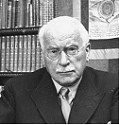 Good evening, and welcome to BBC radio 4. I’m Professor David Stephenson, professor of Dutch historical studies at Cambridge. This is the forty sixth part of our 50 episode special on the second 80 years war over Europe. Joining me for these broadcasts are fellow researchers and scholars Doctor Albert Andrews, specialist in German studies from the Berlin academy, Professor Robert Lowe, specialist in French studies at Cambridge, and a graduate student and technical assistant, Anton Thatcher. Last episode, we ended discussing the start of British resistance.
Good evening, and welcome to BBC radio 4. I’m Professor David Stephenson, professor of Dutch historical studies at Cambridge. This is the forty sixth part of our 50 episode special on the second 80 years war over Europe. Joining me for these broadcasts are fellow researchers and scholars Doctor Albert Andrews, specialist in German studies from the Berlin academy, Professor Robert Lowe, specialist in French studies at Cambridge, and a graduate student and technical assistant, Anton Thatcher. Last episode, we ended discussing the start of British resistance. And resistance from English rebels would continue for over a decade. While the Dutch had conquered territories before, many were captured so rapidly that public opinion could not be firmly entrenched against the Dutch. The British had been at war with the Dutch for more than a lifetime, and the impression that the Dutch people were robbers, villains and selfish tyrants was well believed by men who were now in their forties who had not even been alive at the onset of the war. Unlike the men of Vienna, or Paris, or India who did not have the time to so firmly entrench the idea of Dutch evils, the British had the will to fight against the Dutch for years, attacking in mobs every chance they got.
And resistance from English rebels would continue for over a decade. While the Dutch had conquered territories before, many were captured so rapidly that public opinion could not be firmly entrenched against the Dutch. The British had been at war with the Dutch for more than a lifetime, and the impression that the Dutch people were robbers, villains and selfish tyrants was well believed by men who were now in their forties who had not even been alive at the onset of the war. Unlike the men of Vienna, or Paris, or India who did not have the time to so firmly entrench the idea of Dutch evils, the British had the will to fight against the Dutch for years, attacking in mobs every chance they got. The first Cambridge rebellion had been a spectacular failure, costing the Dutch near to none of their own forces, lacking the ability to rampage across the countryside, or cause any particular economic damage to the Dutch at all, much less military damage. But the British are nothing if not tenacious, and so the second Cambridge rebellion came about less than two years later.
The first Cambridge rebellion had been a spectacular failure, costing the Dutch near to none of their own forces, lacking the ability to rampage across the countryside, or cause any particular economic damage to the Dutch at all, much less military damage. But the British are nothing if not tenacious, and so the second Cambridge rebellion came about less than two years later.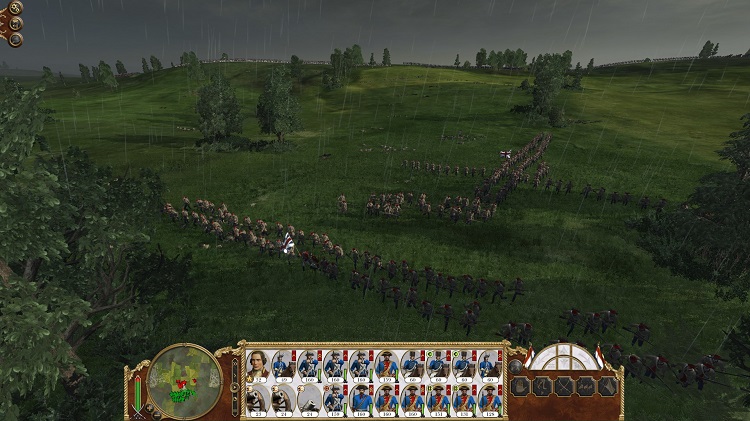
The first Cambridge rebellion was a terrible failure. Often, a country had to be in severe trouble before a rebel force could overwhelm it. Even if oppressed and unhappy, a populace couldn't rise against a massive, well organised military.
 As a matter of fact, the British formed no less than five armed rebellions over the course of eight years. Far more than any other province under Dutch rule. Each time, the Dutch were forced to move forces abroad to eliminate the rebels, spend a small amount of money to return fix damage caused by riots.
As a matter of fact, the British formed no less than five armed rebellions over the course of eight years. Far more than any other province under Dutch rule. Each time, the Dutch were forced to move forces abroad to eliminate the rebels, spend a small amount of money to return fix damage caused by riots.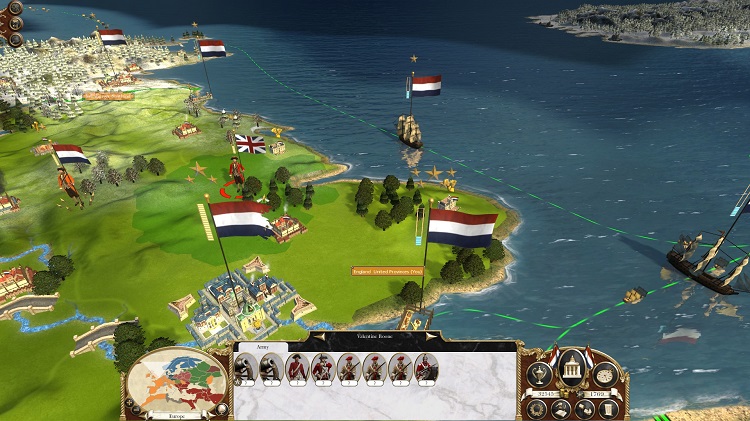
The second Cambridge Rebellion.
 In any event, the second Cambridge rebellion once again consisted of landed elite forming a battalion of guard backed by farmer militia. This time, their guard fought dismounted, so as to better fight shoulder to shoulder with the militia, allowing them to lead by example, unlike the previous horse guard. The Dutch employed the exact same strategy as in their prior battle, and proceeded to bombard the British position with explosive shells from afar.
In any event, the second Cambridge rebellion once again consisted of landed elite forming a battalion of guard backed by farmer militia. This time, their guard fought dismounted, so as to better fight shoulder to shoulder with the militia, allowing them to lead by example, unlike the previous horse guard. The Dutch employed the exact same strategy as in their prior battle, and proceeded to bombard the British position with explosive shells from afar.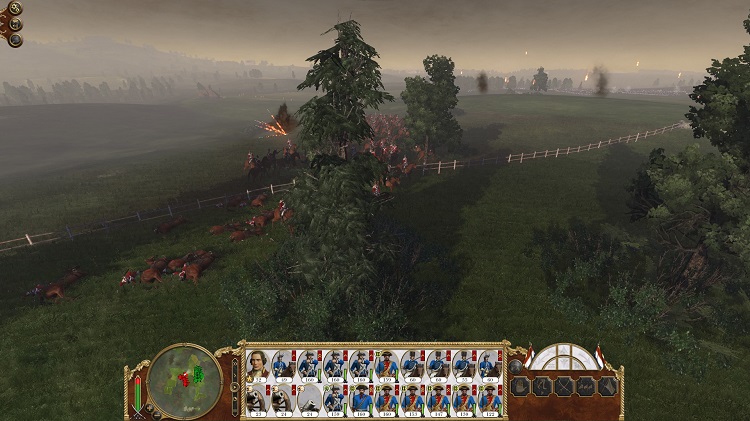
An explosive shell plunges through the fog, killing a dozen British cavalry.
 One poor battalion of militia, charging straight at the Dutch left flank in the vain hopes of smashing them aside and pushing across towards the Dutch center had the grave misfortune of coming across the Dutch blue guard, who had been placed along the left flank. This led to the rapid destruction of the British right, and a reversal of the British plans, in that the Dutch could now turn the flank and put the remaining rebels to flight.
One poor battalion of militia, charging straight at the Dutch left flank in the vain hopes of smashing them aside and pushing across towards the Dutch center had the grave misfortune of coming across the Dutch blue guard, who had been placed along the left flank. This led to the rapid destruction of the British right, and a reversal of the British plans, in that the Dutch could now turn the flank and put the remaining rebels to flight.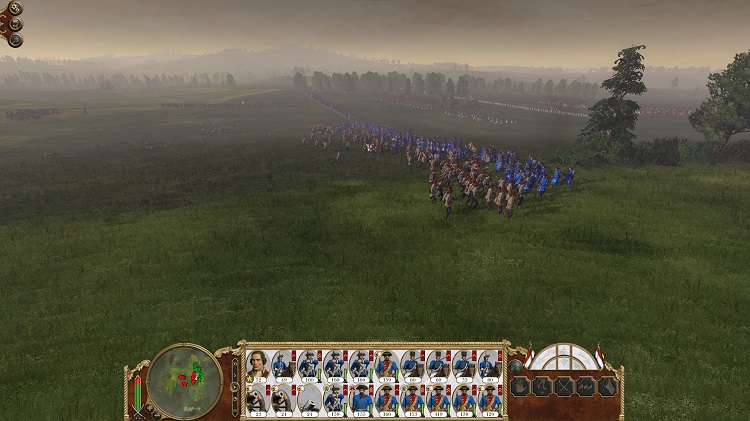
The British courageously attempt to break through the Dutch left flank in a direct melee charge. Meeting the blue guard, they were not successful.
 This left the central battalions of militia in horrid disarray, and they often found themselves firing from off angles in the confusion. Fighting the Holland guard across the entire front, the militia. Even the British guard had no hope, and were fighting a costly losing battle at every turn. The battle once joined was already lost, for the Dutch had the quality and discipline, but also overwhelming numbers.
This left the central battalions of militia in horrid disarray, and they often found themselves firing from off angles in the confusion. Fighting the Holland guard across the entire front, the militia. Even the British guard had no hope, and were fighting a costly losing battle at every turn. The battle once joined was already lost, for the Dutch had the quality and discipline, but also overwhelming numbers.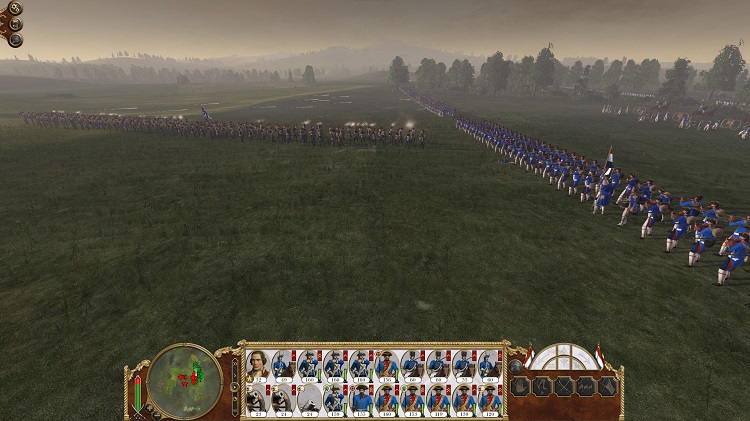
The British militia were turning this way and that, trying to fight in every direction, but actually firing in none. Too panicked to commit to any particular action, they were easily beaten.
 By the end of the battle, the Dutch had managed to push back the militia on both flanks, charging straight into melee in the center to shatter the rest. Dutch cavalry moved in from behind to complete an encirclement, and the British forces were destroyed.
By the end of the battle, the Dutch had managed to push back the militia on both flanks, charging straight into melee in the center to shatter the rest. Dutch cavalry moved in from behind to complete an encirclement, and the British forces were destroyed.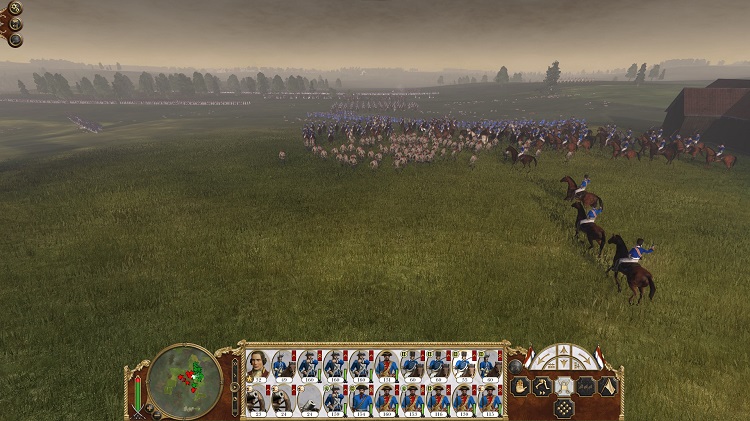
The Dutch cavalry sweep around and crush the remaining rebels.
 The British were forced by the Dutch troops spread across the countryside into a fight that they could not win. They had hoped that they could march through the towns burning and razing factories and gathering more forces from the oppressed, but the Dutch were fast to respond. The Dutch knew fully well how dangerous a rebel army could be if left to grow in strength. The constant elimination and re-emergence of Hungary as a nation was a well observed phenomena to the Dutch, and the lesson they learned from the middle east was a readily applied to England.
The British were forced by the Dutch troops spread across the countryside into a fight that they could not win. They had hoped that they could march through the towns burning and razing factories and gathering more forces from the oppressed, but the Dutch were fast to respond. The Dutch knew fully well how dangerous a rebel army could be if left to grow in strength. The constant elimination and re-emergence of Hungary as a nation was a well observed phenomena to the Dutch, and the lesson they learned from the middle east was a readily applied to England.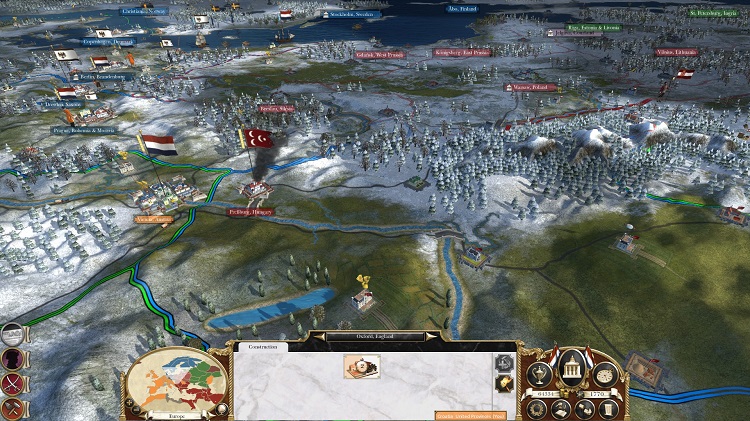
The Dutch had observed the capture and counter capture of the region of Hungary. They learned the power of a rebel force that was given time to grow.
 Even so, the British continued to plot against the Dutch government. The next was the Birmingham rebellion, or the Birmingham ambush. Around the Dutch army, which had been stationed at Birmingham to assist the main guard force at London, the British had been assembling a rebel army. This rebel army hoped to strike a quick sabotage and ambush against the Dutch army, crippling it before it was even aware of their presence. If they succeeded, they believed the country would rise up against the Dutch, letting them retake London.
Even so, the British continued to plot against the Dutch government. The next was the Birmingham rebellion, or the Birmingham ambush. Around the Dutch army, which had been stationed at Birmingham to assist the main guard force at London, the British had been assembling a rebel army. This rebel army hoped to strike a quick sabotage and ambush against the Dutch army, crippling it before it was even aware of their presence. If they succeeded, they believed the country would rise up against the Dutch, letting them retake London.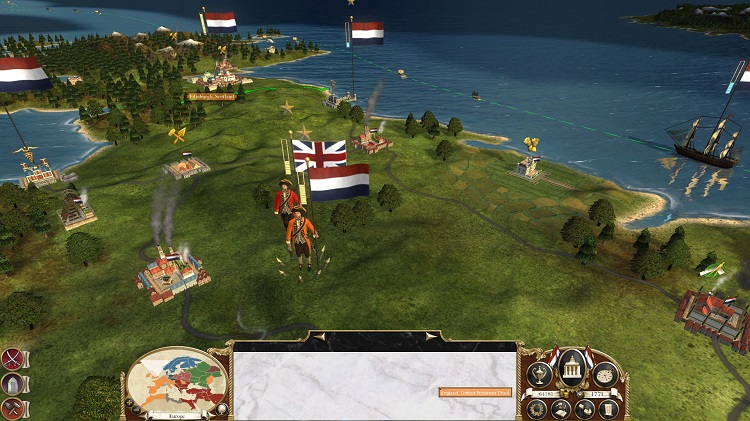
The Birmingham rebellion arises directly behind the Dutch force.
 This was not to be however. Dutch patrols had seen men and suspected conspirators around the niter fields, a crucial location to the creation of gun powder. The Dutch had some of their forces arrest and interrogate those men, and uncovered both the conspiracy and the massing of a British rebel force. The Dutch allowed them to assemble before striking, as they wished to make an example of their forces.
This was not to be however. Dutch patrols had seen men and suspected conspirators around the niter fields, a crucial location to the creation of gun powder. The Dutch had some of their forces arrest and interrogate those men, and uncovered both the conspiracy and the massing of a British rebel force. The Dutch allowed them to assemble before striking, as they wished to make an example of their forces.
Nitrate salts from massive fields. These were actually synthesized from sewage waste.
 The British still managed a surprise for the Dutch forces however. Unlike the guard, the Dutch Birmingham force had no artillery, expecting that they wouldn’t need it. The British however, had made long range rockets. The rockets, the same as the kind used in the Dutch and British navy were easy to construct behind the scenes. While less accurate than the mortar, the rockets were built without the Dutch finding them out.
The British still managed a surprise for the Dutch forces however. Unlike the guard, the Dutch Birmingham force had no artillery, expecting that they wouldn’t need it. The British however, had made long range rockets. The rockets, the same as the kind used in the Dutch and British navy were easy to construct behind the scenes. While less accurate than the mortar, the rockets were built without the Dutch finding them out.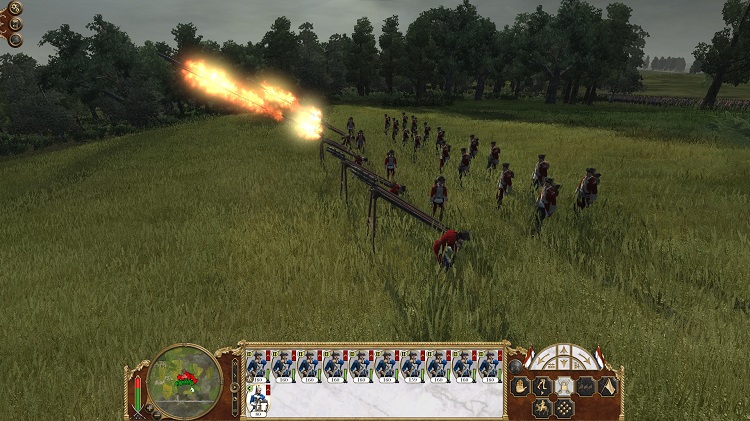
The British managed to create rockets to try and counter the Dutch mortar. The rocket had taken a long time to perfect, but once the theories were understood, and the mathematics were worked out, the actual creation process was relatively simple.
 Under rocket fire, but capable of directly overwhelming the rebel forces, the Dutch simply charged forward. The British once again tried to eliminate a Dutch flank, and had placed their best men on their left. These were the Chasseurs Britanniques , the sons of French Royalists who had fled to England during the Dutch conquest. Their hatred passed along from their fathers, and fostered by the English, these men were able marksmen. Assisting them were the light dragoons.
Under rocket fire, but capable of directly overwhelming the rebel forces, the Dutch simply charged forward. The British once again tried to eliminate a Dutch flank, and had placed their best men on their left. These were the Chasseurs Britanniques , the sons of French Royalists who had fled to England during the Dutch conquest. Their hatred passed along from their fathers, and fostered by the English, these men were able marksmen. Assisting them were the light dragoons.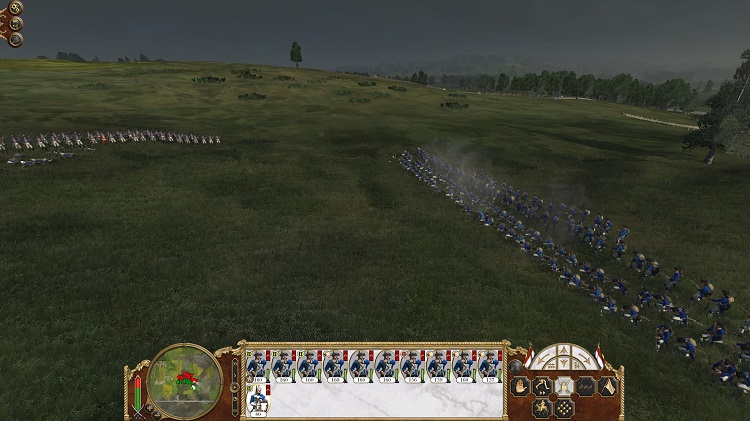
The British committed the best of their troops to their left flank.
 The British flank was doing well against the Dutch right, but the Dutch heavy dragoons exploited their weakness in melee. Pushing straight into the rebel left flank, the heavy dragoons pushed through the riflemen and light cavalry.
The British flank was doing well against the Dutch right, but the Dutch heavy dragoons exploited their weakness in melee. Pushing straight into the rebel left flank, the heavy dragoons pushed through the riflemen and light cavalry.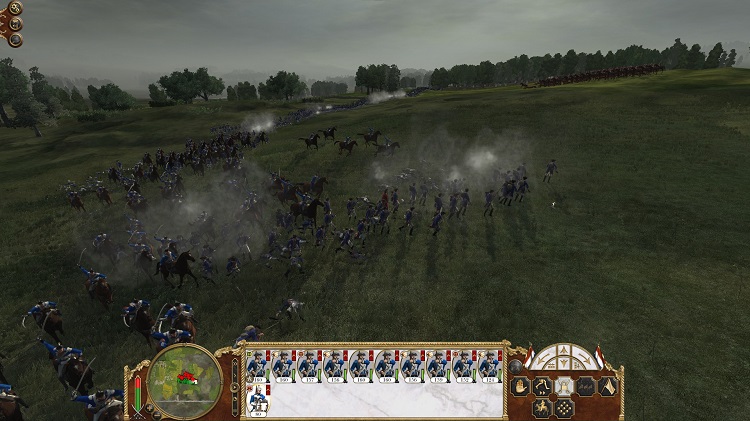
The Dutch heavy dragoons shatter the light French riflemen. Lacking bayonets or sufficient numbers to form a square, the riflemen had no hope against the cavalry charge.
 The last of the British forces remaining were their guard, held at the center. They had charged into two battalions of line, and had nearly forced the center, but the Dutch, having cleared away all other rebel forces, encircled them, charged them from all sides, and destroyed them. The rebels did not get away this time. As the Dutch were aware of the conspiracy, and were taking stock of members prior to the battle, men who had tried to slip back into a civilian life after the battle were dragged from their homes and executed at the firing line.
The last of the British forces remaining were their guard, held at the center. They had charged into two battalions of line, and had nearly forced the center, but the Dutch, having cleared away all other rebel forces, encircled them, charged them from all sides, and destroyed them. The rebels did not get away this time. As the Dutch were aware of the conspiracy, and were taking stock of members prior to the battle, men who had tried to slip back into a civilian life after the battle were dragged from their homes and executed at the firing line.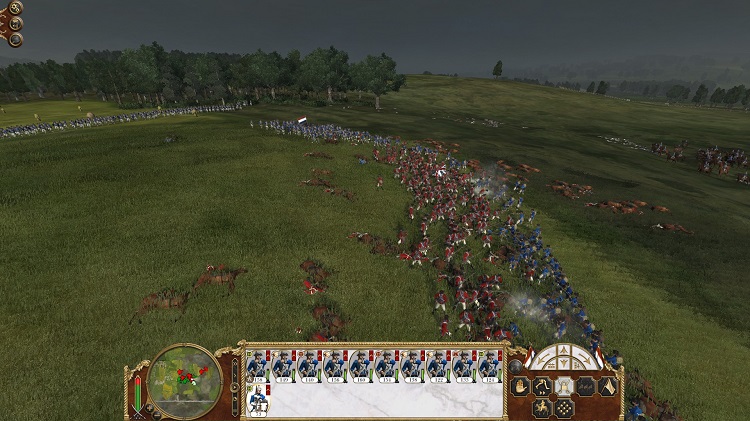
The last of the rebel forces were surrounded and destroyed. The survivors and alleged co-conspirators were hounded down and executed.
 The next rebellion would take place in 1772 around East Anglia. These rebels had been financed by the Polish, and had heavy artillery of Polish make, heavy cavalry, and muskets that the Dutch had thought cleared from the countryside. The Dutch were unable to confirm that the muskets were Polish as well, but the alternative was that the rebels were using very well made homemade muskets. They also made several dozen rockets, and so it is possible that their lighter weapons were homemade rather than smuggled in.
The next rebellion would take place in 1772 around East Anglia. These rebels had been financed by the Polish, and had heavy artillery of Polish make, heavy cavalry, and muskets that the Dutch had thought cleared from the countryside. The Dutch were unable to confirm that the muskets were Polish as well, but the alternative was that the rebels were using very well made homemade muskets. They also made several dozen rockets, and so it is possible that their lighter weapons were homemade rather than smuggled in.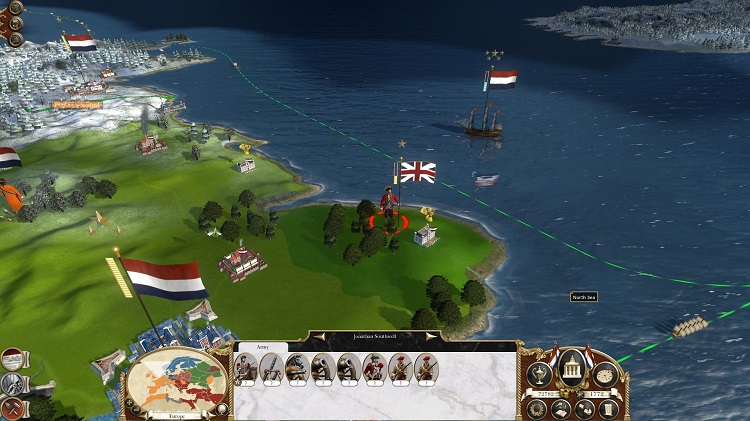
Once again, the Dutch encounter a British rebel force arises.
 In any event, this time the guard was deployed to destroy the rebels. The Dutch mortar proved its superiority against the rockets, killing far more men than the grossly inaccurate rockets could. Still, the Dutch wished to silence the British artillery as soon as possible, and so their hussars leapt into action in a swarm. A British battery of howitzers was immediately destroyed. The hussars then charged into the British lines, forcing them into square. The square prompted a retreat of the hussars, but in square, the British infantry were demonstrably more vulnerable to the artillery fire. As a more dense formation, any hit from a shell killed far more men.
In any event, this time the guard was deployed to destroy the rebels. The Dutch mortar proved its superiority against the rockets, killing far more men than the grossly inaccurate rockets could. Still, the Dutch wished to silence the British artillery as soon as possible, and so their hussars leapt into action in a swarm. A British battery of howitzers was immediately destroyed. The hussars then charged into the British lines, forcing them into square. The square prompted a retreat of the hussars, but in square, the British infantry were demonstrably more vulnerable to the artillery fire. As a more dense formation, any hit from a shell killed far more men.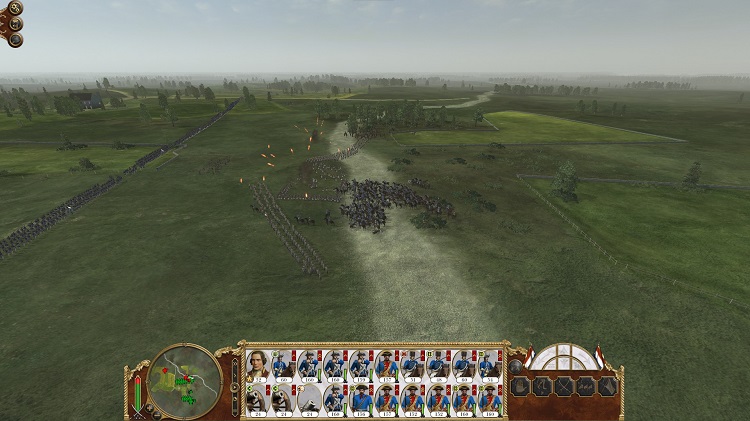
A single shell blows an entire corner off a rebel square.
 By the time all this chaos had resolved, the entire Dutch line advanced into musket range of the British militia. The Dutch guard were once again proving their worth as shells whistled overhead, mowing down the British lines where they stood. The British line did not take long to crack, and the British heavy cavalry were forced to charge forward to block their retreat. The Dutch Hussars, outnumbering them three to one however, managed to run most of them down before turning to the infantry. Ironically, more of the fleeing heavy cavalry survived than the militia.
By the time all this chaos had resolved, the entire Dutch line advanced into musket range of the British militia. The Dutch guard were once again proving their worth as shells whistled overhead, mowing down the British lines where they stood. The British line did not take long to crack, and the British heavy cavalry were forced to charge forward to block their retreat. The Dutch Hussars, outnumbering them three to one however, managed to run most of them down before turning to the infantry. Ironically, more of the fleeing heavy cavalry survived than the militia.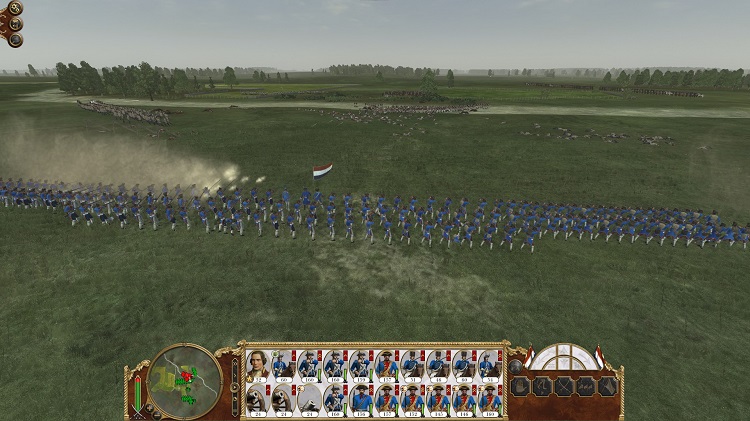
The Dutch once again find themselves musket to musket against the rebel forces. All in all, less than five hundred of the Dutch had been killed in rebel assaults, while three thousand British rebels had been killed.
 The British managed to evade the Dutch all the way to the coast, but with their backs to the ocean, and the Dutch clearly uninterested in letting a few men survive, they were forced to turn and fight. The hussars, which had been hounding them for days, finally had them found and cornered. By now, there was no hope whatsoever for the British troops. There were only ten of them left alive.
The British managed to evade the Dutch all the way to the coast, but with their backs to the ocean, and the Dutch clearly uninterested in letting a few men survive, they were forced to turn and fight. The hussars, which had been hounding them for days, finally had them found and cornered. By now, there was no hope whatsoever for the British troops. There were only ten of them left alive.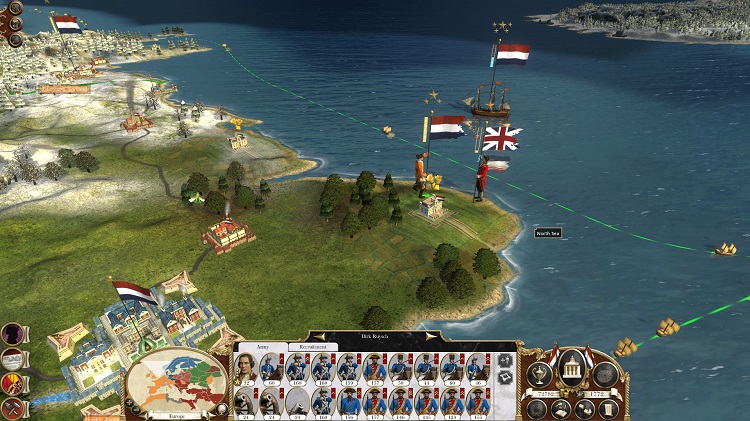
The Dutch pursue the rebels to the coast. The few British men were trying to disperse, but those that did were caught up and killed.
 The British simply stood and watched, tired, and completely resigned to their fate as the hussars swung in from both flanks. Hundreds of cavalry swept in at the last of the British forces, the initial charge more than adequate to kill every one of the British. The entirety of the rebel force was once again destroyed, this time with no chance for a structured execution.
The British simply stood and watched, tired, and completely resigned to their fate as the hussars swung in from both flanks. Hundreds of cavalry swept in at the last of the British forces, the initial charge more than adequate to kill every one of the British. The entirety of the rebel force was once again destroyed, this time with no chance for a structured execution.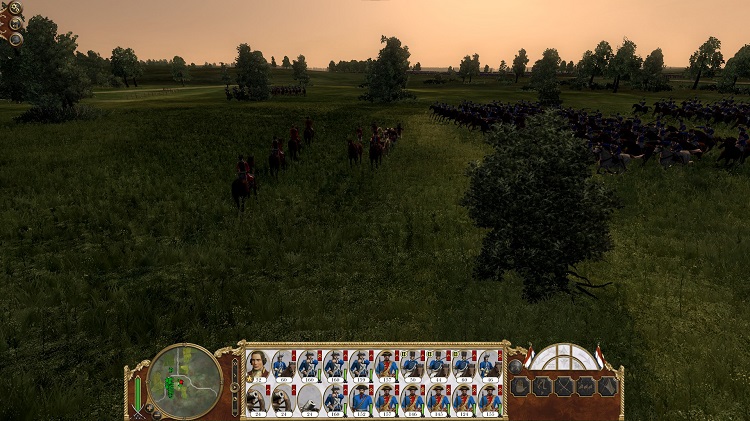
The Dutch hussars sweep in against the few British defenders. The British were too tired to fight back, after days of retreat.
 By 1774, the British were growing tired of these rebellions, while the Dutch, who were putting far less effort in controlling these rebellions than the British were in plotting them, had simply replenished the guard and continued to police London and Birmingham. This would be the last rebellion the British would be willing to attempt.
By 1774, the British were growing tired of these rebellions, while the Dutch, who were putting far less effort in controlling these rebellions than the British were in plotting them, had simply replenished the guard and continued to police London and Birmingham. This would be the last rebellion the British would be willing to attempt.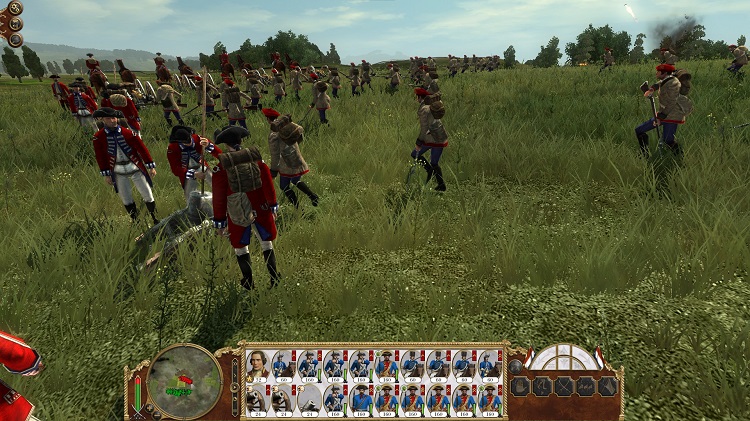
The last British rebels try one last assault. They had little hope of success, but they were determined to try.
 This was further west than the first two rebellions, but was called the third Cambridge rebellion. This battle, the British had managed to sneak into a Dutch military compound, stealing a mortar and muskets. Other British conspirators had broken into a museum, stealing a rapid firing gun emplacement. While it required considerable tinkering to render functional, it would at least fire before the rebellion. This time, none of the nobility, who had become quite wealthy over the past six years were willing to contribute to the fight, and as such, it was the first rebellion to lack the nobility in a de facto guard battalion. Instead, the entirety were farmers, factory workers and French expatriates.
This was further west than the first two rebellions, but was called the third Cambridge rebellion. This battle, the British had managed to sneak into a Dutch military compound, stealing a mortar and muskets. Other British conspirators had broken into a museum, stealing a rapid firing gun emplacement. While it required considerable tinkering to render functional, it would at least fire before the rebellion. This time, none of the nobility, who had become quite wealthy over the past six years were willing to contribute to the fight, and as such, it was the first rebellion to lack the nobility in a de facto guard battalion. Instead, the entirety were farmers, factory workers and French expatriates. 
The third Cambridge rebellion.
 Lacking any proper line infantry, the rebels had no force which could properly defend against cavalry. And so, the Dutch forces simply charged their cavalry forward as their infantry advanced. The Chasseurs Britanniques as the sole forces which could actually aim a gun were singled out and quickly eliminated.
Lacking any proper line infantry, the rebels had no force which could properly defend against cavalry. And so, the Dutch forces simply charged their cavalry forward as their infantry advanced. The Chasseurs Britanniques as the sole forces which could actually aim a gun were singled out and quickly eliminated.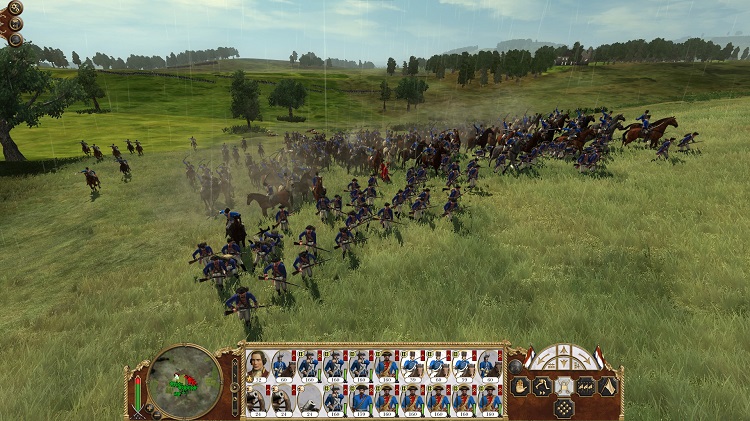
The French light infantry are run down first in a devastating cavalry charge. Once in melee, they had nothing to defend themselves with.
 By the time they were wiped out, the remainder of the Dutch guard had advanced. In range, musket to musket, the remaining British were hopelessly outmatched, and so when they found themselves charged in melee, they quickly shattered. The guard, eager to avoid door knocking and execution duty later that week quickly ran them all down, or at the very least, that’s what they reported.
By the time they were wiped out, the remainder of the Dutch guard had advanced. In range, musket to musket, the remaining British were hopelessly outmatched, and so when they found themselves charged in melee, they quickly shattered. The guard, eager to avoid door knocking and execution duty later that week quickly ran them all down, or at the very least, that’s what they reported.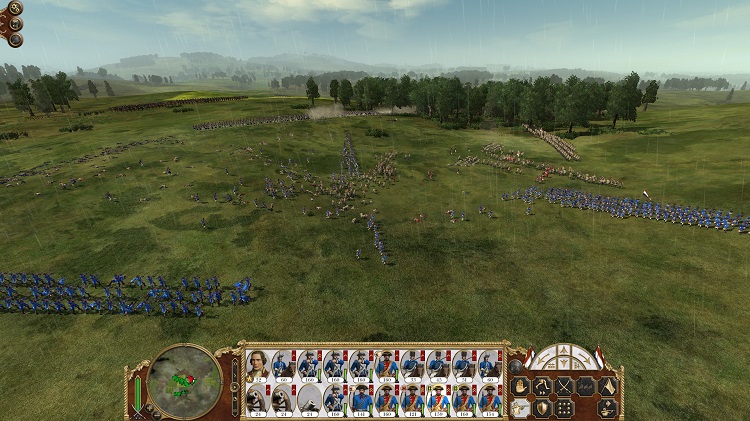
The Dutch run straight through the remaining British militia.
 This was the last rebellion against the Dutch the British would manage. The Dutch had been in control of all of Britain for eight years, and with it, they had prospered just as every other nation under their rule had. The economy had doubled, and taxes were dropped from forty to twenty seven percent. The standard across the empire. British business men who accepted the Federation were favoured over the others, and were becoming wealth very quickly. While the workers kept up their fervor for far longer, after their ability to finance a rebellion ended, they began to accept their lot in life. After all, the Dutch ministers were not all that different from British parliament.
This was the last rebellion against the Dutch the British would manage. The Dutch had been in control of all of Britain for eight years, and with it, they had prospered just as every other nation under their rule had. The economy had doubled, and taxes were dropped from forty to twenty seven percent. The standard across the empire. British business men who accepted the Federation were favoured over the others, and were becoming wealth very quickly. While the workers kept up their fervor for far longer, after their ability to finance a rebellion ended, they began to accept their lot in life. After all, the Dutch ministers were not all that different from British parliament. The war in Britain officially ended in 1774, when the last of the rebel forces were beaten. The Dutch would wait four more years to make sure the country had truly stabilized before reinstating a British parliament with a new constitution and laws putting them under the Federation. The British royal family had been locked up after the capture of Scotland, and would be replaced by the grand nephew of William the third, William the fourth as the new monarch of Britain. The true royal family of Britain was kept essentially as hostages in Paris, well away from their support base, but as they were related to much of the high ranking politicians of the United Provinces, and even of the Federation as a whole, it was impossible to treat them too harshly without many of their prominent members protesting.
The war in Britain officially ended in 1774, when the last of the rebel forces were beaten. The Dutch would wait four more years to make sure the country had truly stabilized before reinstating a British parliament with a new constitution and laws putting them under the Federation. The British royal family had been locked up after the capture of Scotland, and would be replaced by the grand nephew of William the third, William the fourth as the new monarch of Britain. The true royal family of Britain was kept essentially as hostages in Paris, well away from their support base, but as they were related to much of the high ranking politicians of the United Provinces, and even of the Federation as a whole, it was impossible to treat them too harshly without many of their prominent members protesting. Next, we will be discussing the history and techniques of bone China with Professor Smith, followed by world news. If you want news of the current war in the Middle East please channel in to BBC radio 1. David Stephenson will be presenting more on the 80 years war in 3 days.
Next, we will be discussing the history and techniques of bone China with Professor Smith, followed by world news. If you want news of the current war in the Middle East please channel in to BBC radio 1. David Stephenson will be presenting more on the 80 years war in 3 days.